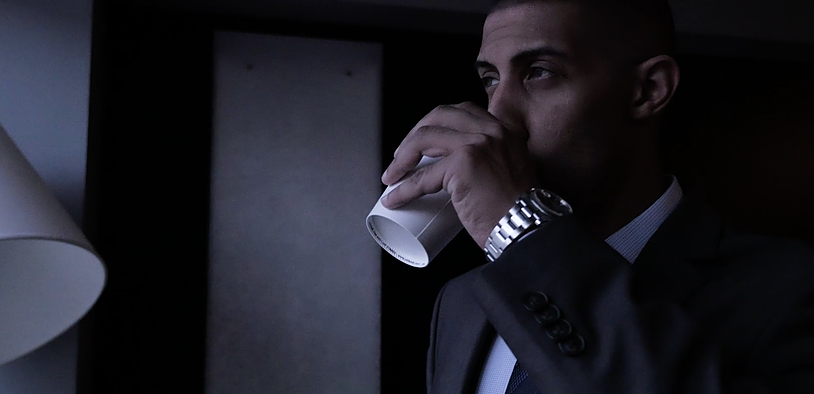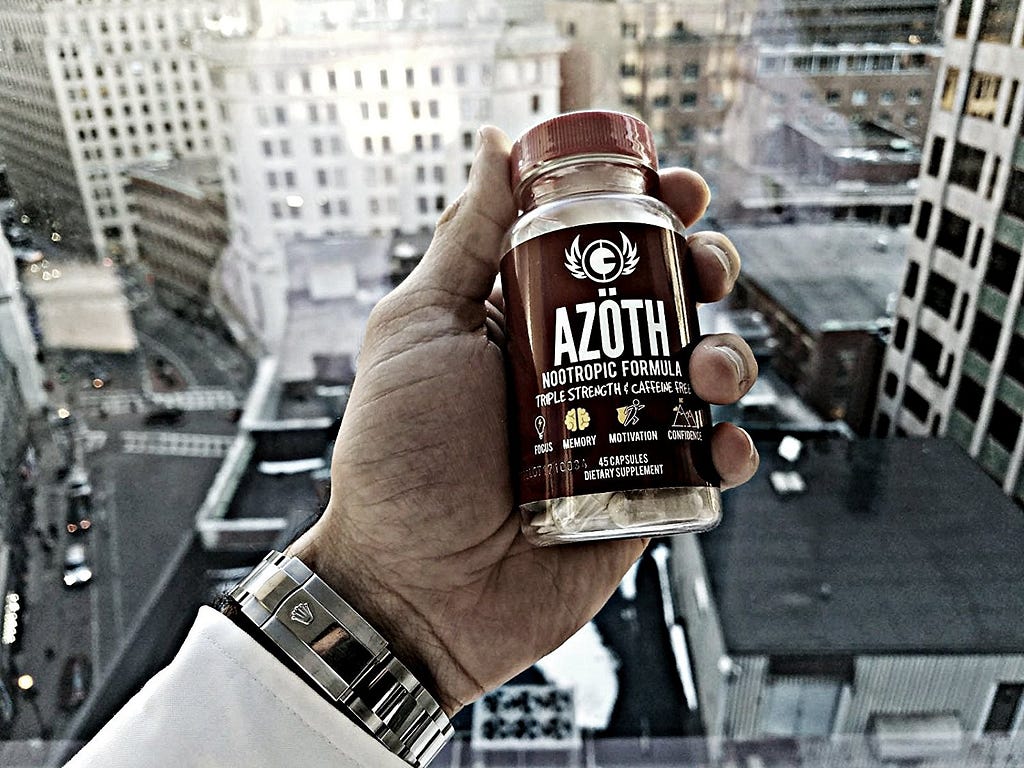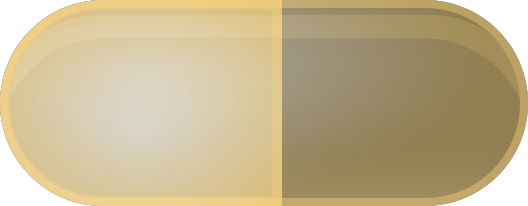Nootropics Can Boost Your Mood — but it’s a complex mechanism and requires the right ingredients.

by Robert Schinetsky
We work longer hours. We drive farther distances to get to work, and we have more demands at work and at home.
On top of that, with the increased reliance on wireless communication, we’re more easily accessible than ever, which makes round the clock work requests and summons.
Add it all together, and you’ve got the perfect recipe for increased stress and decreased happiness, which quite frequently leads to feelings of depression, anxiety, and a reduced sense of self.
Now, depression is often blamed solely on an imbalance of neurotransmitters in the brain; however, reducing a serious disease such as depression to something as simple as the balance of your neurochemicals is a gross oversimplification of the disease and does a disservice to those who combat the affliction on a daily basis.
The truth is, depression is a much more complex disease, and research notes that there could be numerous causes of depression (medication, genetics, medical problems, etc.) outside of your levels of serotonin, dopamine, acetylcholine, and all the rest of the important neurotransmitters.[1,2]
But, seeing that this is a nootropics blog, we’re going to see how your neurons and neurotransmitters impact feelings of stress, anxiety, and depression along with what nootropics you can supplement with to alleviate these feelings.
So, with that in mind…
The Hippocampus Link to Depression
While the imbalance of your neurotransmitters may be the first thing that comes to mind when discussing the topic of depression, research indicates that the issue may go much deeper than that.
German researchers studied 24 women who had a history of depression, and documented that their hippocampus on average was 9–13% smaller than that of healthy women. Researchers also noted that the women who more frequently had depressive episodes, had the smallest hippocampal size.[3]
What’s so important about the hippocampus?
Well, for starters, the hippocampus is the region of the brain that plays a critical role in regulating your emotions. It’s also the site where several major neurotransmitters are produced including:
● Glutamate (the primary excitatory neurotransmitter)
● GABA (the primary inhibitory or “downer” neurotransmitter)
● Acetylcholine (the “learning” neurotransmitter)
● Noradrenaline (one of the fight or flight hormones)
● Serotonin (the neurotransmitter most commonly associate with mood)
On top of that, the hippocampus plays a significant role in learning and memory, and it is one of two major sites responsible for neurogenesis — the creation of new brain cells.[4,5] In other words, the hippocampus is really, really, really important to not only how you feel on a daily basis, but your ability to learn and remember too. It also plays a central role in combating cognitive decline, due to its role in promoting the growth of new neurons.
Now, we also know that stress plays a role in depression, and studies have documented that stress can impact neurogenesis.[6]
The “opposite” of neurogenesis is apoptosis, a process by which brain cells self-destruct. A protein called brain-derived neurotrophic factor (BDNF) can prevent apoptosis and, even better, it can promote the growth of new neurons (i.e. neurogenesis) and synapses (the junction or “gap” between two nerve cells).[7]
Basically, we want to increase BDNF and neurogeneration while limiting apoptosis, which is why researchers are currently exploring various medications for the treatment of depression that promote neurogenesis, improve neural signaling, and bolster neuron connections.
Fortunately for us, there are several readily available, and all natural, nootropics that boost BDNF and promote neurogenesis (more on that in a bit).
The Role of Neurotransmitters in Depression
To understand the role neurotransmitters play in depression, we’re going to have to drill down into the inner workings of how neurons communicate with each other through the use of neurotransmitters.
Don’t worry, we won’t go too in-depth into the molecular biology of it, but we will have to get up close and personal with the neuron.
Neurons a specialized type of cell specifically designed to communicate with each other via nerve impulses. When a neuron is “activated”, it passes an action potential down its axon to the axon terminal. FYI, the axon terminal is also where neurotransmitters are stored.[8]
Once the action potential reaches the axon terminal, certain neurotransmitters are released into the synapse and “picked up” by the dendrite on the receiving neuron. As the number of neurotransmitters in the synapse increases, they bind to receptors on the membranes of the two neurons. When these neurotransmitters are released, they can either activate or inhibit (de-activate) the downstream neuron.
Now, each neuron has an internal feedback mechanism that tells it to stop releasing neurotransmitters when a set amount has been released. Once this point is reached, the neuron starts collecting the neurotransmitters it just released in a process called reuptake.
In people who are manic or severely depressed, this process of neurotransmitter release, reuptake, etc goes haywire and results in either too much or too little of a given neurotransmitter being released. It’s also possible that the reuptake mechanism is a bit too good at its job and “sweeps up” too many neurotransmitters before they can bind to the downstream receptor.
Any one of these actions, or some combination thereof, can have a serious impact on your overall mood.
Which Neurotransmitters Are We Talking About?
Up until now, we’ve spoken about depression and neurotransmitters in broad terms without singling out specific neurotransmitters that contribute to feelings of poor mood, anxiety, and stress.
Well, now it’s time to get specific.
The primary neurotransmitters involved in depression include:
● Acetylcholine
● Dopamine
● Glutamate
● GABA
● Norepinephrine
● Serotonin
As you probably noticed, all of these (except for dopamine) were mentioned during our discussion of the role of the hippocampus in the progression of depression. While prescription medications are often used to balance these neurotransmitters, they often come with serious drawbacks and often leave individuals worse off than they started.
The good news is that these neurotransmitters can also be effectively balanced by the proper application of several different nootropics, which we’ll cover in a minute.
Before we get to what nootropics can help treat depression, let’s take a look at how stress plays a role in depression.
Stress and Depression
All of us, no matter how wonderful our life may be, has experienced stress in some form or another. While not all of us who experience a stressful episode develop depression, stress does play a big role in the development of depression, especially if you’re a person who is particularly sensitive to stress, or feel chronically stressed all the time.
Combined with some out-of-whack brain chemistry or a family history of depression, you’ve got all the makings that can lead to developing the disease.
If you are one of these individuals who walk around with the weight of the world on your shoulders constantly, there is a bit of hope, as several of the neurotransmitters involved in stress are also involved with depression (as is the hippocampus), and both can be improved through the use of nootropics.
With that in mind, let’s take a look at which nootropics you can look into if you’re experiencing symptoms of stress, depression, or anxiety.
Nootropics for Stress & Depression
If you’re currently feeling overly stressed or have bouts of depression, but don’t really feel comfortable taking synthetic pharmaceuticals, you’re not alone. More and more people these days are turning to alternative medicine in search of more natural ways to treat their various ailments, and while we’re not discounting the benefits of modern medicine, there are several nootropics that can help you beat the blues and restore your overall sense of well-being.
● Bacopa Monnieri
A staple of ayurveda, Bacopa monnieri is an herb used for centuries to help combat fatigue, relieve anxiety, and restore energy levels. Bacopa monnieri is an adaptogen that improves the body’s response to all sorts of stressors, and has been clinically shown to work as well as benzodiazepines and tricyclic antidepressants.[10]
● Rhodiola Rosea
Another powerful adaptogen with a long history of use, rhodiola stimulates the AMPA receptors in your brain which reduces feelings of depression and stress-induced mood swings. Rhodiola has also been shown to combat fatigue, improve cognition, and boost energy.
Research notes that this age-old plant was about as effective as sertraline (Zoloft) for treating depression, except it was much better tolerated and came with fewer side effects.[11]
● Coenzyme Q10 (CoQ10)
Present in every cell of the body, CoQ10 is the cell’s natural source of energy by funneling fat into the mitochondria to be oxidized (“burned”) for energy.
CoQ10 is a potent antioxidant helps preserve cognitive function and combat migraines as well as mental illness. Research notes supplementing with 1200mg per day of CoQ10 led to a significant reduction in symptoms of depression in bipolar individuals.[12]
● Sulbutiamine
Sulbutiamine is an enhanced form of Vitamin V1 (thiamine) that readily crosses the blood-brain barrier where it works to heighten mood, increase motivation, and improve memory.
Research conducted in the United Kingdom noted that supplementation with thiamine led to improvements in mood, memory, and reaction time. The women taking part in the study also noted feeling more clear headed and energetic as well.[13]
This powerful form of Vitamin B1 is also effective for fighting chronic fatigue and can help restore natural energy levels.[14]
Due to this, we’ve included a robust 400mg dose of Sulbutiamine in every serving of AZOTH 2.0, to help promote mental clarity and focus, while reducing mental fatigue.
● 5-HTP
5-HTP is the direct precursor to serotonin, one of your body’s “happy” hormones/neurotransmitters. Your body can naturally produce 5-HTP from the amino acid tryptophan, which is present in the foods we eat.
Now, while 5-HTP is effective for increasing serotonin, it must be mentioned that you need to be cautious when using it.
Anytime you use nootropics to increase serotonin, you want to also include ones that raise dopamine levels too, as an imbalance of either one can lead to decreased efficacy and depletion of the other neurotransmitter. In other words, if you only supplement with 5-HTP and nothing to boost dopamine, you’re at risk for dopamine deficiency, and vice versa.[15]
Speaking of nootropics that can boost dopamine…
● Tyrosine
L-Tyrosine is an amino acid used by the body to synthesize dopamine, and subsequently, epinephrine (adrenaline) and norepinephrine (noradrenaline), two of your “fight or flight” hormones that also impact mood.
Supplementing with L-Tyrosine helps improve motivation and mood as well as memory and cognition during times of stress.[16] Furthermore, tyrosine may also boost creativity and decision-making as well as help you achieve the vaunted “flow state”, which is precisely why we’ve included it in every serving of AZOTH 2.0, the ultimate nootropic for productivity.
● Caffeine
If you’ve ever woken up after a long night feeling run down, grumpy, and altogether worn out, you know the energy and mood-elevating powers of caffeine.
Few supplements on the planet are as powerful as caffeine when it comes to increasing mood, motivation, and concentration. The reason caffeine is so powerful is due to a couple of reasons.
First, it gives a pretty strong boost to your dopamine levels, which heightens mood, but is also blocks adenosine[17], a neurotransmitter that tell your body is fatigued. By inhibiting adenosine, caffeine promotes greater energy, movement, focus, and most importantly, mood.
Caffeine can be found just about anywhere and everywhere these days, and quite often, it’s over done, in our humble opinion. Some is great, too much and you’re feeling anxious, jittery, and on edge. That’s why we’ve included a modest 400mg of Yerba Mate in every serving of Total Energy.
Our Yerba Mate extract provides 120 mg of caffeine and theobromine which provides smooth, consistent energy with no harsh stimulant kick or nasty crash. By using a natural form of energy in yerba mate, you can rest assured you’ll experience all the uplifting mood and energy effects of caffeine without the unfortunate side effects of other caffeine-based products.
Click here to learn more about the nootropic benefits of Yerba Mate — the best of tea and coffee COMBINED.
● L-Theanine
Have you ever noticed how the feeling you get from tea is different than that of coffee?
Both have caffeine, and both taste utterly delicious, so why does coffee make you feel over-stimulated and tea makes you just feel pleasantly upbeat and alert.
The answer is in a little amino acid called L-Theanine. It’s a staple ingredient of many nootropic stacks, including AZOTH 2.0, due to its synergism with caffeine.[18,19]
Theanine promotes a sense of “relaxed” alertness, by increasing alpha brain waves.[20] But, the mood-boosting benefits don’t end there.
L-Theanine also enhances production of dopamine, serotonin, and GABA, which help improve mood and provide a sense of “controlled calm”. Furthermore, when theanine is combined with caffeine, you experience all the energy and focus-boosting qualities of caffeine without the unpleasant crash, anxiety, or “on edge” feeling you do with coffee.[21]
Takeaway
Depression is a serious illness that up until recently had largely been cast aside as nothing other than feeling overly sad on occasion. The truth is, depression is very real and affects more people than you probably realize.
While modern medicine has developed a number of avenues to treat it, many people don’t feel comfortable taking prescription drugs or some respond well to them. Nootropics represent a strong, and natural, alternative to antidepressant medications.
Be warned though, that if you are currently taking prescription medication for depression, DO NOT combine with any nootropics. Consult with your doctor and research any nootropic you are considering to see if any interactions may occur.
Written by Robert Schinetsky, a leading author and expert on all things dietary supplements. Robert currently writes for AZOTH LLC — a leading nootropic brand.

References
1. Qato DM, Ozenberger K, Olfson M. Prevalence of Prescription Medications With Depression as a Potential Adverse Effect Among Adults in the United States. JAMA. 2018;319(22):2289–2298. doi:10.1001/jama.2018.6741
2. https://www.health.harvard.edu/mind-and-mood/what-causes-depression
3. Frodl T, Schaub A, Banac S, et al. Reduced hippocampal volume correlates with executive dysfunctioning in major depression. Journal of Psychiatry and Neuroscience. 2006;31(5):316–325.
4. Barlow C, Targum SD. Hippocampal Neurogenesis: Can it be a Marker for New Antidepressants? Psychiatry (Edgmont). 2007;4(5):18–20.
5. Lee MM, Reif A, Schmitt AG. Major depression: a role for hippocampal neurogenesis? Curr Top Behav Neurosci. 2013;14:153–179. doi:10.1007/7854_2012_226
6. Mirescu C, Gould E. Stress and adult neurogenesis. Hippocampus. 2006;16(3):233–238. doi:10.1002/hipo.20155
7. Chen S-D, Wu C-L, Hwang W-C, Yang D-I. More Insight into BDNF against Neurodegeneration: Anti-Apoptosis, Anti-Oxidation, and Suppression of Autophagy. Lin G, ed. International Journal of Molecular Sciences. 2017;18(3):545. doi:10.3390/ijms18030545.
8. Lodish H, Berk A, Zipursky SL, et al. Molecular Cell Biology. 4th edition. New York: W. H. Freeman; 2000. Section 21.4, Neurotransmitters, Synapses, and Impulse Transmission.
9. Mora F, Segovia G, Del Arco A, de Blas M, Garrido P. Stress, neurotransmitters, corticosterone and body-brain integration. Brain Res. 2012;1476:71–85. doi:10.1016/j.brainres.2011.12.049
10. Bhattacharya S.K., Bhattacharya A., Sairam K., “Ghosal S. Anxiolytic-antidepressant activity of Withania somnifera glycowithanolides: an experimental study.” Phytomedicine 2000 Dec;7(6):463–9.
11. Mao J.J., Xie S.X., Zee J., Soeller I., Li QS., Rockwell K., Amsterdam J.D. “Rhodiola rosea versus sertraline for major depressive disorder: A randomized placebo-controlled trial.” Phytomedicine. 2015 Mar 15;22(3):394–9.
12. Forester B.P., Zuo C.S., Ravichandran C., Harper D.G., Du F., Kim S., Cohen B.M., Renshaw P.F. “Coenzyme Q10 effects on creatine kinase activity and mood in geriatric bipolar depression.” Journal of Geriatric Psychiatry and Neurology. 2012 Mar;25(1):43–50.
13. Benton D., Griffiths R., Haller J. “Thiamine supplementation mood and cognitive functioning.” Psychopharmacology 1997 Jan;129(1):66–71.
14. Tiev K.P., Cabane J., Imbert J.C. “[Treatment of chronic postinfectious fatigue: randomized double-blind study of two doses of sulbutiamine (400–600 mg/day) versus placebo].” La Revue de Medicine Interne 1999 Oct;20(10):912–8.
15. Hinz M, Stein A, Uncini T. 5-HTP efficacy and contraindications. Neuropsychiatric Disease and Treatment. 2012;8:323–328. doi:10.2147/NDT.S33259.
16. Coull N.A., Watkins S.L., Aldous J.W., Warren L.K., Chrismas B.C., Dascombe B., Mauger A.R., Abt G., Taylor L. “Effect of tyrosine ingestion on cognitive and physical performance utilising an intermittent soccer performance test (iSPT) in a warm environment.”European Journal of Applied Physiology. 2015 Feb;115(2):373–86
17. Ribeiro JA, Sebastião AM. Caffeine and adenosine. J Alzheimers Dis. 2010;20 Suppl 1:S3–15. doi:10.3233/JAD-2010–1379
18. Owen GN, Parnell H, De Bruin EA, Rycroft JA. The combined effects of L-theanine and caffeine on cognitive performance and mood. Nutr Neurosci. 2008;11(4):193–198. doi:10.1179/147683008X301513
19. Dodd FL, Kennedy DO, Riby LM, Haskell-Ramsay CF. A double-blind, placebo-controlled study evaluating the effects of caffeine and L-theanine both alone and in combination on cerebral blood flow, cognition and mood. Psychopharmacology. 2015;232(14):2563–2576. doi:10.1007/s00213–015–3895–0.
20. Mason R. “200 mg of Zen” Alternative and Complementary Therapies. July 2004, 7(2): 91–95.
21. Nathan PJ, Lu K, Gray M, Oliver C. The neuropharmacology of L-theanine(N-ethyl-L-glutamine): a possible neuroprotective and cognitive enhancing agent. J Herb Pharmacother. 2006;6(2):21–30.
Can Nootropics Really Help with Stress, Anxiety, and Depression? was originally published in AZOTH on Medium, where people are continuing the conversation by highlighting and responding to this story.


Be the first to comment